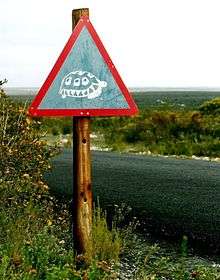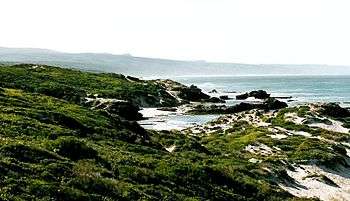De Hoop Nature Reserve
The De Hoop Nature Reserve is located in the Western Cape Province in South Africa.
Understand
De Hoop is a 34 000-hectare reserve that is three hours from Cape Town, in the Overberg. It is a favourite for hikers, cyclists, and bird and whale watchers. The neighbouring marine reserve, which extends 5 km out to sea, is one of the largest marine protected areas in Africa. The reserve is a World Heritage Site.
De Hoop has one of the best hiking trails in South Africa: the Whale Trail. This route offers coastal and mountain walking, with spectacular views and plenty of opportunities for whale watching. This route is a five-day trail with accommodation on each of the five nights.
History
Landscape
Flora and fauna
Climate
Get in

You can get in only by car or 4x4 if wet. The best road to take is the one from Swellendam. Note that there are only gravel roads from Swellendam to the De Hoop, so you will not be able to drive at very high speeds.
Get around
By car or by foot.
See

De Hoop is one of the less-known Nature Reserves and not very crowded. Although relatively small, you can come close to a number of rare animals. Near the camp are normally big herds of Bontebok (which can also be seen at nearby Bontebok National Park). These white and brown antelopes are only known in the Cape Region. There are also ostriches and elands and other antelopes, baboons and a vast number of birds (be sure to bring a book about the local birds to identify them). Some smaller mammals and reptiles, tortoises and snakes and occasional leopards can be seen.
The main attraction however are the whales. The Southern Right Whales have to pass here during the whale season for their breeding grounds. Ten or more wales can sometimes be seen at a time from the beach.
De Hoop is also home to approximately 1500 species of plant life. 108 of these are threatened and 34 only occur in De Hoop. 14 species were recently discovered (!) and are still undescibed.
You should buy a book about local wild and plant life before you arrive, as well as warm clothes for the colder nights or when the wind blows. Binoculars and a camera are some of the most important things, if you want to show pictures of this beautiful place to friends and family at home.
Do
De Hoop is the location of the famous Whale Trail, a 5-day hike 55 km along the coast with, in whale season, great views of the whales along the coast. Book early as the trail is booked up far in advance, especially in whale season. No children under eight are permitted on the trail.
You can drive around in your car, looking for some of the antelopes. This is however not very interesting, as most animals will be near the camp.
The better option is to go hiking. There are some wonderful hiking trails starting at the camp. The trail along the dam is highly recommended.
Even more beautiful are the trails at the beach. Drive towards the beach (Lekkerwater residents are already located there) and leave you car at the bus stop, next to the toilets and information point. From here, either go left along the beach. There are some steep dunes, but all in all this trail is quite easy. Whales and water birds can be seen best from the top of the dunes and cliffs.
Buy
Eat

There is no shop in De Hoop itself. So be sure to bring something to eat, especially when staying overnight. The shops in Swellendam will offer you everything you will need.
There is also an outpost near the camp, which caters for some basic needs. Please note that it is closed most of the time.
When leaving the De Hoop Gate, turn left immediately and follow the road for a minute or two. You will end up at a private camp, which also has a restaurant (very good food). If you want to go there in the evening, tell the staff at the reception, so they can arrange that someone lets you in, once the gates are closed (normally at dusk).
Drink
Sleep
Lodging
There is a camp in De Hoop called the Opstal. You can book accommodation in different chalets and bungalows. There are 28 self-catering cottages and houses, all of which are fully equipped. There are also seven campsites and each can accommodate up to six people in tents or caravans.
Near the beach are two houses, called Koppie Alleen and Lekkerwater, which is great for groups.
No matter if you booked in advance or not, make sure to be at the camp by 16:00 or only shortly later!
Reservations can be made at res@dehoopcollection.co.za or view the website at www.dehoopcollection.co.za
Camping
Backcountry
Stay safe
Go next
Go to Bredasdorp and visit the Kapula Candle factory and shop. The candles have very nice African motives and are sold all over the world.
Further on is the Cape Agulhas, the most southern tip of Africa!
From De Hoop it will take you up to an hour, because of the gravel roads. However, it is a beautiful drive, along the fields and ostrich farms. If you like gravel road, you can continue past the Moravion mission village of Elim and rural Baardskeerdersbos to Gansbaai on Danger Point Peninsula.